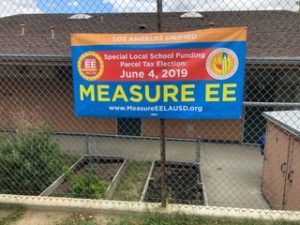 There has been a growing concern of late—although the roots go back decades—of California government entities funding so-called information campaigns for upcoming tax increase ballot measures that have the feel of advocacy. The latest test is the parcel tax measure next month to increase funding for the Los Angeles Unified School District. Other school districts in the state are likely to follow LAUSD’s lead if the Measure EE parcel tax campaign is a success.
There has been a growing concern of late—although the roots go back decades—of California government entities funding so-called information campaigns for upcoming tax increase ballot measures that have the feel of advocacy. The latest test is the parcel tax measure next month to increase funding for the Los Angeles Unified School District. Other school districts in the state are likely to follow LAUSD’s lead if the Measure EE parcel tax campaign is a success.
Lately, the Fair Political Practices Commission has taken note of some of the “information” campaigns. A bill has been introduced to allow the FPPC enforcement power to crack down on local entities that practice using taxpayers’ money to encourage a vote for new public dollars in the form of taxes or bonds. Local prosecutors don’t bother to intervene in these elections, according to an FPPC report.
Yet, using public funds to push the virtues of a tax increase is illegal. Dan Walters has pointed out this government pretense of claiming public funds are for information purposes in his column time and again.
The California Supreme Court has declared that using public funds to influence elections “…presents a serious threat to the integrity of the electoral process.”
The stance often cited by advocates who put on these so-called information campaigns is that if they don’t declare “Vote for…” something then they are not advocating a position. Yet, a legal standard that should be applied in these situations is the “Reasonable Person” approach. A “reasonable person” is one who exercises average care, skill, and judgment. What does a “reasonable person” think when viewing some of the material put out by a government entity?
One school in the Los Angeles school district, for example has posted three banners on the school grounds highlighting the coming vote. A photo of the banner is above. The banner notifies observers of the coming election and directs them to a website. www.MeasureEELAUSD.org At the website, there is readily found plenty of information that supporters of the tax increase claim will be accomplished if the tax receives a two-thirds vote to pass:
- Attract and retain high-quality teachers and school employees.
- Reduce class sizes.
- Provide quality instructional programs such as science, technology, English and math, as well as school resources and materials.
- Expand arts and music programs, enabling more students to participate.
- Enhance vocational and career training to prepare students for good jobs.
- Provide preschool programs to help the youngest students with a strong start in school.
- Provide school nursing, library, counseling services, and other health and human services for student support.
- Provide safe, secure, clean, well-maintained, supportive, and welcoming schools.
- Provide school support services for students with disabilities, low-income students, homeless and foster youth, or otherwise disadvantaged students.
There is not a word about the issue raised by opponents of Measure EE that no reforms come with this measure and that much of the money is needed because pension and health care costs are taking chunks of funds from the school budget threatening insolvency, according to the County Board of Education.
If you dig deep enough in the website you will find a link to the ballot booklet issued by Los Angeles County for the election, which carries both the pro and con arguments for the measure. Further, additional digging will lead you to links to the websites of the Yes and No campaigns. That’s after you get by photos of smiling children and the bullet point summation of what the tax would provide, according to its sponsors.
Are these links enough to say we are dealing with information and not advocacy?
One banner at the school is along a fence with other banners highlighting certain businesses (seen here).

I expect the banner placement was allowed because those businesses that are touted on the banners—a children’s dentist, a tech company, an auto repair and two realtors, among others– have offered some support for the school. Good for them supporting the school. But don’t the banners also serve as advertising?
If these banners are viewed as advertising, would the LAUSD Measure EE banner also be advertising? What would a reasonable person think? Information or advocacy?
More importantly, what do prosecuting authorities and the FPPC think and what might they do about it?

